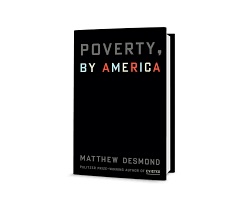Books can serve as catalysts for change. After gaining popularity and praise, including winning a Pulitzer Prize last year, “Evicted: Poverty and Profit in the American City” by Matthew Desmond is a masterpiece that sheds light on housing injustices throughout the city of Milwaukee.
I was drawn to “Evicted” because it showcases the stories of Milwaukee families struggling to keep a roof over their heads. But on a more macro level, these stories shed light on issues of poverty and housing discrimination that run rampant through many urban areas. It is eerie being able to recognize street names and Milwaukee landmarks mentioned throughout the book and heartbreaking to hear the disparities between the individuals’ renting experiences and my own — especially when these stories unfold nearly in my backyard.
Desmond, a Harvard sociologist, spent the better half of a decade studying the relationship between poverty and eviction — with a great amount of his research conducted in Milwaukee. He lived alongside these families, witnessing first-hand the systemic racism and housing discrimination that plague these individuals and the effects of the lack of consistent housing on their mental and physical well-being.
One of the lesser-known topics Desmond sheds light on in “Evicted” is the nuisance property ordinance and the issues that surround this policy. Nuisance ordinances, also known as disorderly house ordinances, categorize a property or unit a nuisance after a certain number of calls for police are made within a 30-day period.
Like many policies similar to the nuisance property ordinance, they are initially enacted to prevent violence and help the greater community. But there are many unintended consequences to these policies that often go unaddressed. Because of how the ordinance is enforced, it can contribute to an underreporting in domestic violence altercations for fear of being evicted. It is clear that the nuisance policy, while implemented with good intentions, is extremely harmful to both victims of abuse and the community where these individuals live.
The Milwaukee 80-10 Nuisance Ordinance penalizes landlords and homeowners when police are called to a residence three or more times over a 30-day period. Before the code was amended in 2011, calls classified as “domestic abuse,” “sexual assault” and “stalking” were all considered nuisances that could count against a victim as per the nuisance ordinance. After three or more calls have been made about a specific residence, legally it is at the corresponding landlord’s discretion to evict the tenant.
From the landlord’s perspective, they are either faced with steep penalties for owning and managing a nuisance property or forced to abate the nuisance through eviction of the tenant. Desmond’s research also found that landlords facing nuisance ordinances went as far as discouraging tenants from calling the police and refusing to renew current tenants’ leases.
In “Evicted,” Desmond analyzes two years’ worth of nuisance ordinances in Milwaukee and compares them to the properties that receive nuisance complaints and the properties that meet criteria for receiving nuisance complaints, but don’t. He finds that if an individual is living in a primarily black neighborhood, they are far more likely to receive a nuisance citation. Desmond concludes that domestic violence is the third most common nuisance in the city of Milwaukee. Because of the fear of losing their homes, victims of domestic abuse are faced with a dilemma: Speak out against their abusers and face potential eviction, or remain silent and keep their homes. When adding other socioeconomic variables such as children, income and employment into the equation, this issue can become quite complex and difficult to discern.
In attempts to combat this issue of housing discrimination, the Milwaukee 80-10 Nuisance Ordinance was reworked in 2011 to exclude “domestic abuse,” “stalking” and “sexual assault” from possible nuisance categorizations. This is a step in the right direction; however, this amendment falls short in protecting domestic abuse victims from losing their housing. Although it no longer excludes these three categorizations, the ordinance still encompasses broader categorizations such as “harassment” and “battery” that count against tenants.
Because of this, altercations that would have been formerly classified as a domestic abuse offense could just as easily be labeled as a “harassment” call based on the responder’s discretion. In theory, the nuisance ordinance is necessary to deter crime in urban areas, but it actually undermines public safety and punishes innocent people — especially vulnerable people who have fewer resources.
Due to the complexity of domestic violence cases, it is unrealistic to attempt to categorize every situation into a handful of buzzwords. Instead of penalizing victims of domestic violence, it is the responsibility of the local jurisdiction to ensure these victims feel empowered to speak out against their abusers without reservation or fear of losing their homes.
Like many issues of this nature, they should be handled on a case-by-case basis. This begins with informing tenants who call in domestic abuse related altercations that they are no longer at risk of eviction for reporting these instances. Milwaukee Police and other local agencies must collaborate and work closely with tenants to address underlying problems that lead to excessive police calls.
The nuisance ordinance currently in place in the city of Milwaukee does far more harm than good; it is harmful to both the property owners and victims of domestic violence. Based on Desmond’s extensive research, it is evident based on how the nuisance ordinance is being enforced that it is discriminatory toward minority groups.
Americans should have access to affordable and consistent housing, and the ordinance currently in place hinders this basic right. The harmful, unintended consequences that arise from these nuisance laws stem from how the policy is created, enforced and the lack of awareness many people have about this issue. “Evicted” and research focused on this issue have begun to shed light on this epidemic, and the traction this book has gained since being published will continue to bring this pressing issue to light and evoke change. Taking steps to advocate for domestic violence survivors disenfranchised by the current ordinance is a small piece of the puzzle necessary to solve the nationwide housing crisis.





Sgt Todd Lewan • Nov 30, 2017 at 12:55 pm
Your unintended misinformation needs to be corrected so anyone reading this article will not be dissuaded from calling for police service when needed. Thank you.
Kori Schneider Peragine • Nov 30, 2017 at 12:16 pm
While I agree that these unintended consequence may exist, I wonder if there is evidence of it. Were you able to interview any representatives from Sojourner or other DV agencies?
The Milwaukee Housing Coalition and others worked to modify the Nuisance ordinance several years ago to protect victims of domestic violence. So if the changes to the ordinance aren’t protecting victims, it may be time to revisit it’s language or practice.
Sgt Todd Lewan • Nov 30, 2017 at 8:48 am
The enforcement of the Milwaukee Police Department’s nuisance property ordinance does not apply to instances of domestic abuse. Please contact our department for more specific information. I’m sure the PIO can assist you.
Cathy Steffke • Nov 30, 2017 at 1:19 pm
Todd, what does PIO mean?